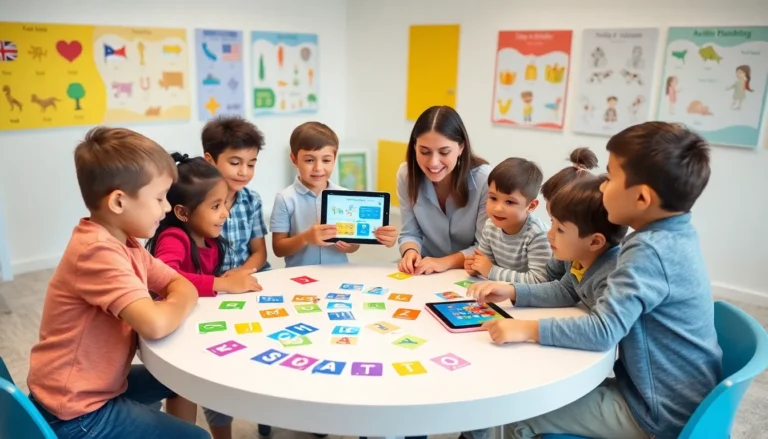Table of Contents
ToggleHave you ever wondered why the brain seems to light up like a Christmas tree when someone learns a new language? Picture this: language learning is not just about mastering grammar and vocabulary, it’s like giving your brain a workout that would make even an Olympic athlete proud. From enhancing memory to fueling creativity, learning a new language is a brain-boosting adventure that can sharpen mental acuity and delay cognitive decline. So, whether you’re a polyglot or just dipping your toes into a new tongue, let’s explore the incredible cognitive benefits crammed into that second language.
Cognitive Benefits of Language Learning

When someone dives into a new language, exciting things begin to happen in their brain. The cognitive benefits are astounding and can affect various aspects of everyday life.
Enhancing Memory and Recall
Learning vocabulary, phrases, and rules boosts memory and helps improve recall. It’s like turning on a superpower. Engaging with a new language challenges individuals to remember countless details, meaning their brain develops sharper retention skills. Studies reveal that multilingual individuals often outperform their monolingual counterparts in memory tasks, showcasing just how crucial mental workouts can be.
Improved Problem-Solving Skills
Language learning involves a lot more than just rote memorization. It encourages strategic thinking and enhances problem-solving abilities. When learners confront new sentence structures or idioms, they train themselves to think critically and adaptively, troubleshooting their way through the language maze. This analytical approach can spill over into daily life, allowing them to tackle challenges with creative solutions.
Boosting Creativity and Innovation
Have you ever noticed how a new language can spark inspiration? The linguistic diversity leads to different ways of thinking. Bilingual individuals can navigate multiple perspectives, which encourages innovation. This freedom of expression develops creative thinking as learners engage with varied cultures and ideas, all while communicating in different tongues.
Neuroplasticity and Brain Growth
The brain is a remarkable organ capable of adapting and changing through a process called neuroplasticity. This adaptability plays a crucial role in how language learning transforms one’s cognitive landscape.
The Impact on Brain Structure
Research indicates that learning a new language can physically change brain structure. Areas connected to memory, emotion, and learning become denser with gray matter, and that’s a good thing. Increased density can lead to greater mental agility, providing a sharper cognitive edge.
Communicative Flexibility and Mental Agility
Have you ever seen a multilingual speaker switch languages effortlessly? That’s communicative flexibility in action. Language learners can switch between different modes of thinking, fostering mental agility. This ability to juggle multiple languages enhances cognitive flexibility, which becomes a vital asset as they navigate their daily lives.
Language Learning and Delayed Cognitive Decline
As people age, cognitive decline can become a pressing concern. Fortunately, language learning emerges as a formidable ally in combating this ubiquitous challenge.
Protecting Against Dementia
Studies indicate that bilingual individuals often experience dementia symptoms later in life than monolingual peers. Engaging multiple languages appears to create cognitive resilience. The mental gymnastics from juggling languages seem to fortify the brain against the onset of cognitive impairments, making it a potential game-changer for aging individuals.
The Role of Bilingualism in Aging
Bilingualism serves as a buffer against cognitive decline by encouraging lifelong neural engagement. By continuously using their linguistic skills, older adults can maintain mental sharpness, so enhancing their quality of life as they gracefully age.
Practical Tips for Learning a New Language
So, how does one embark on this enriching journey of language learning? Here are practical strategies to make the process enjoyable and effective.
Effective Methods for Language Acquisition
There are plenty of fun and effective methods to pick up a new language. Interactive apps, language exchange meetups, and immersive experiences can boost motivation and retention. Practicing through conversation, rather than memorizing alone, helps engage both the brain and the heart, making the journey more fulfilling.
Setting Realistic Goals and Practices
Setting achievable goals can turn the overwhelming challenge of learning a language into a series of manageable milestones. Whether it’s mastering ten new words per week or holding a simple conversation, these small victories create motivation and a sense of accomplishment, pushing them forward on their language journey.






